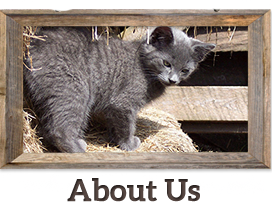Library
-
Nitrofurantoin is an antibiotic used to treat bacterial urinary bladder infections. It is typically used as a second-line antibiotic, when broad-spectrum antibiotics have not cleared the infection. It is used “off label” or “extra label” in veterinary medicine. Nitrofurantoin comes in capsule or liquid forms given orally. Never use in food-producing animals or animals intended for food.
-
Nystatin is an antifungal, given by mouth in the form of a tablet or liquid suspension, and used off label to treat Candida fungal infections in dogs, cats, birds, and reptiles. Side effects are rare, but at high doses, it could cause stomach upset or mouth irritation. It should not be used in pets that are allergic to it.
-
Olopatadine ophthalmic is an antihistamine medication used to treat pruritus (itchiness) of the eyes caused by allergies in animals. Olopatadine ophthalmic comes in liquid drop suspension form.
-
Ferrets are generally good-natured, inquisitive, playful animals that enjoy the company of humans. They can make great pets! This handout provides some basic facts about ferrets and what you need to know about keeping one as a pet.
-
Gerbils generally make good family pets but should never be left unsupervised with small children. If well-socialized from a young age and treated gently, they can be wonderful pets. The incisors (front teeth) of all rodents grow continuously throughout the animal's life. Gerbils do not require vaccines, but they should have annual examinations.
-
If well socialized from a young age and treated gently, hamsters are generally slow moving, reasonably easy to handle, and affectionate. Hamsters make good family pets but should never be left unsupervised with small children. Hamsters should have annual physical examinations and fecal tests for intestinal parasites.
-
Rats are extremely intelligent, inquisitive, interactive, and social. If well socialized from a young age and treated gently, they are easy to handle, affectionate, and rarely bite unless provoked. Rats generally make good family pets but should never be left unsupervised with small children. Rats live about 2 to 3 years. The incisors (front teeth) of all rodents grow continuously throughout the pet's life. Rats should be examined by a veterinarian at least once a year and twice a year as they get older.
-
Pet rodents, sometimes also referred to as pocket pets are very popular pets. Hamsters, rats, mice, gerbils, and guinea pigs are the most common rodents kept as pets. They make good first pets for young children and as a rule require minimal care.
-
Guinea pigs live, on average, 5-6 years; although some can live to 8-10 years of age. Their teeth grow continuously, throughout life, and it is critical that they eat grass hay, such as Timothy hay, every day to help them wear down their teeth as they grow. Young guinea pigs display a unique behavior called popcorning when they are happy, in which they jump straight up in the air and let out squeals of delight. Guinea pigs reach sexual maturity at around 3-4 months of age; therefore, if young males and females are housed together, they should be separated by this age, otherwise they are likely to breed. The average gestation period for guinea pigs is 63 days. If gestation continues over 70 days, the guinea pig should be seen immediately by a veterinarian, and it is likely that the entire litter will be stillborn.
-
Oxytetracycline/polymyxin B ophthalmic (brand name Terramycin®) is a combination antimicrobial medication used to treat certain types of bacteria (gram-positive and gram-negative). It is used to treat eye infections in cats and dogs. It is used “off label” or “extra-label” to treat eye infections in avian species, hedgehogs, and rabbits. Oxytetracycline/polymyxin B comes in ointment form.


